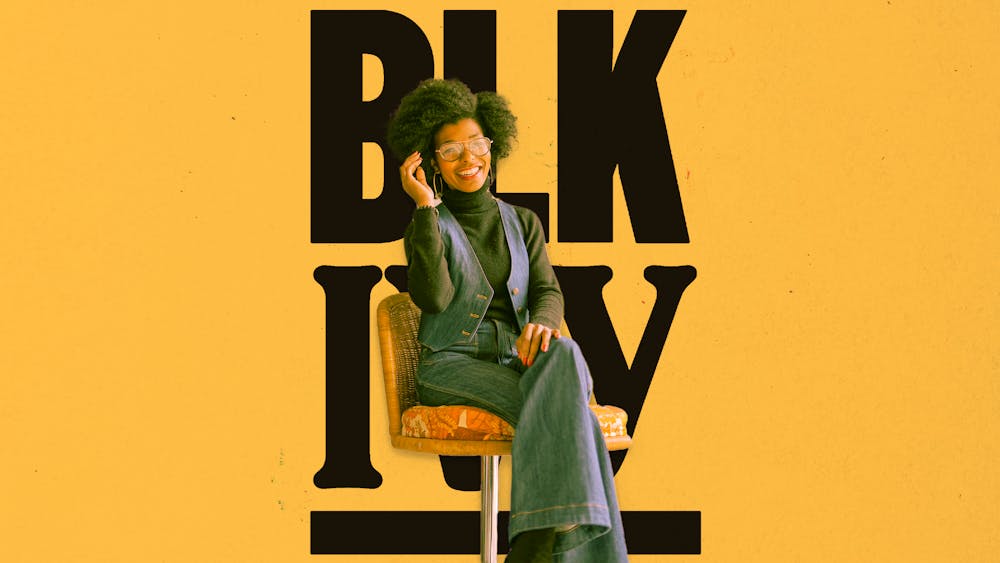The Black Panthers wore leather jackets, second–wave feminists wore miniskirts, and anti–Vietnam war protestors wore bell bottoms. Throughout history, fashion has been used by various social movements as forms of self–expression, resistance, and solidarity.
Using her part–thrift store, part–museum Blk Ivy as a conduit, Kimberly McGlonn seeks to chronicle and preserve how fashion has been used for activism by various Black civil rights activists during the 1950s–1970s. And if Blk Ivy is more about preserving and telling the story of the past, then her new store, Grant Blvd, is about looking forward and making a sustainable future. This spring, Blk Ivy moved into Grant Blvd’s previous location at 3605 Lancaster Avenue, and Grant Blvd will open its new flagship location in the heart of the Penn community across from Hill College House at 3401 S. 34th St.
Blk Ivy is an homage to the period of Black fashion known as Black Ivy. McGlonn first came across references to the style when watching a documentary about 1960s jazz trumpeter from Philadelphia, Lee Morgan. Black Ivy was popular amongst Lee and his contemporaries, including Miles Davis and James Baldwin. The Black Ivy look combined the staples of the white Ivy League elite, like seersucker blazers, button down shirts, and chino pants, with workwear, sunglasses, and beads symbolizing the Black Power movement. This look played double duty, helping to fit in to and command the same respect as the elites who wore this conservative and professional style, while also subverting the Ivy look and making it their own.
Months after hearing about Black Ivy in the jazz scene, McGlonn was in a bookstore in Culver City and spotted Jason Jules’ book, Black Ivy: A Revolt in Style. “Oh my gosh, this is why I'm here at this bookstore,” she thought. After that, she decided to open a first of its kind museum dedicated to the fashion of that moment.
While, Black Ivy was often adorned by men of the era, and McGlonn wanted to expand the narrative: “While the Black Ivy style was a part of it, it was just one way that style was being used as activism.” McGlonn also wanted to include the fashion of women like Angela Davis, a former Black Panther, activist, and professor, and Shirley Chisholm, the first Black person to run for a major party’s presidential nomination and first women to run for the Democratic Party’s nomination. She also wanted to extend the timeline by including the 1950s, with the Brown v. Board of Education Supreme Court decision and Chisholm’s campaign in 1974.
McGlonn’s unique take on Black Ivy style is accessible to everyone through the store’s Instagram, @blkivy thrift. But the brick–and–mortar store is a must–see destination for any vintage lover or history aficionado. Alongside the curated collection of 1960s and 70s styles, the store sells records, books, and home décor. Each item, whether vintage or crafted by a local artisan, celebrates the beauty of the civil rights movement. McGlonn finds pieces for her store across the country. “Blk Ivy is the story of my travels,” says McGlonn. “I travel all over and I grab things as I'm moving about that are going to tell the story.” She hopes through Blk Ivy, more people will participate in the preservation of history and culture.
But McGlonn isn’t only looking to preserve the past: “I think of Black Ivy as standing in this moment and recognizing all of the ways in which our civil rights as Americans in different places are under attack and the need to revive a sense of optimism, but also a sense of tactics to preserve civil rights. So we're using fashion to look backwards for models. Grand Blvd aspires to be a vehicle for fashion to look forward.”
Through Grant Blvd, named after the street McGlonn grew up on in the North Side of Milwaukee, she seeks to look at the future of fashion and place herself within the arc of Black fashion. The clothes at Grand Blvd feature “bold hues and unexpected tailoring.” McGlonn describes her mission as creating “the uniform for luminaries.” Of course, activism is core to Grant Blvd as well, with McGlonn centering sustainability and transparency in the production of clothing for the store.
Clothing from Grant Blvd is sourced from a textile supplier in New York that owns a sustainable textile library. Grant Blvd will bring this responsible fashion to the heart of Penn’s campus. “What we're planning on doing on Penn's campus is to say, ‘these are the beauties of this fabric, and these are the liabilities of this fabric. And so depending on what your price point is, or what you what your tastes are, our goal is that we teach people about what they're wearing,’” she said. McGlonn hopes for Grant Blvd to be like “Gucci, but sustainable.”
Grant Blvd’s Instagram, @grantblvd, offers a peek into the store’s new location. But shoppers also can experience the recently opened business in person while in Philadelphia. Grant Blvd opened on Earth Day of this year, a deliberately set date to celebrate the opening of a Black–owned, sustainably sourced clothing store along with the annual celebration of the Earth and the need to protect it for future generations.

